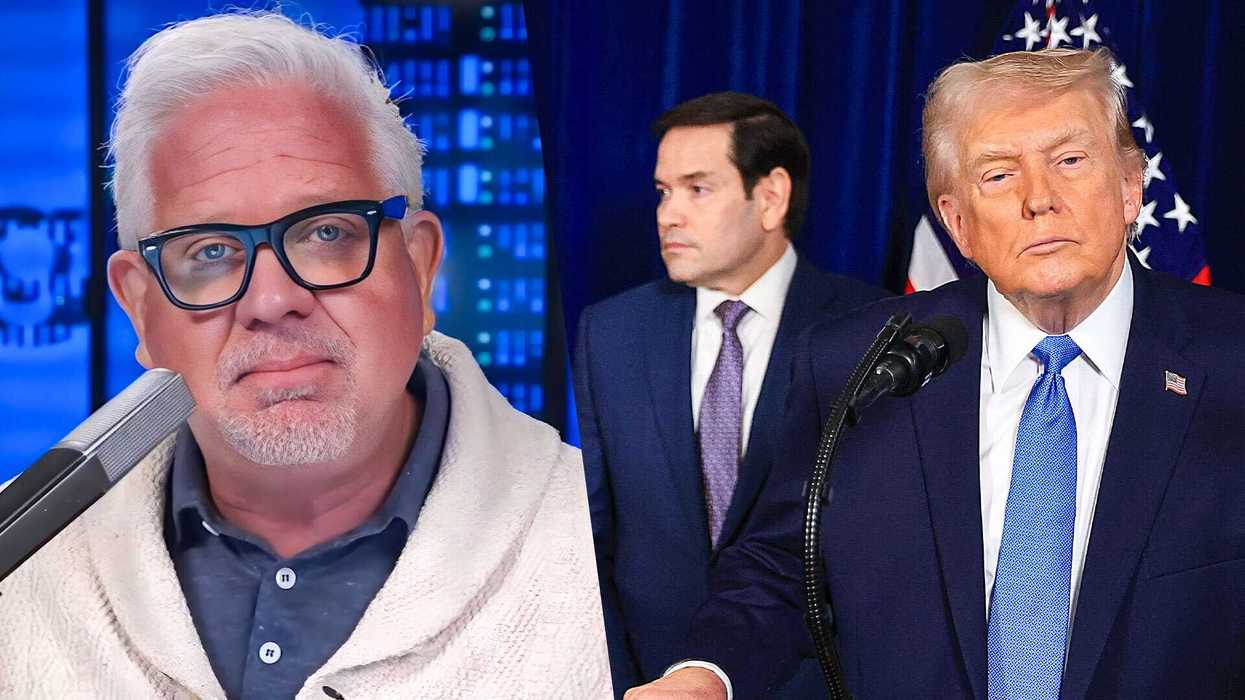
© 2026 Blaze Media LLC. All rights reserved.

Ted Stevens may be gone, but his legacy lives on.
Sen. Lisa A. Murkowski (R-Alaska) and Rep. Donald E. Young (R-Alaska) are the ringleaders behind legislation (S.730 & H.R.1408) that would allow Sealaska Corporation of Juneau to clear-cut the Tongass National Forest.
Supporters of the proposed land transfer met last Wednesday with representatives of the Department of Agriculture to discuss legislation that will allow Sealaska to make land selections from an area that includes the Tongass’ few remaining old-growth stands.
Sealaska led the charge behind Alaskans Standing Together, the super PAC that propelled Murkowski from GOP-primary-loser to write-in-winner and Republican Senator in 38 days by spending $1.7 million on a pro-Murkowski ad campaign.
Following meetings with congressional committees last week, multiple Capitol Hill sources involved in the discussions said the Murkowski-Young legislation is gaining traction in the Republican-controlled House and could emerge as part of an omnibus package pending the actions of the House Natural Resources Committee—which is bad news for the ancient trees Sealaska wants to harvest, but far worse for the local communities the corporation’s logging threatens to destroy.
Sealaska is one of 12 regional corporations Congress created through the Alaskan Native Land Claims Settlement Act of 1971 oversee the distribution to the native population of roughly $1 billion in federal funds and 44 million acres of land.
The largest non-federal landholder in Southeast Alaska, Sealaska stands to gain an additional 123-33 square miles of territory, depending on how House Republicans feel about another wilderness omnibus debacle.
Sealaska pays no taxes on the land it currently owns and harvests and enjoys 8(a) non-competitive contracting status with the federal government. But the corporation is not strapped for cash. In addition to its donations to AST, Sealaska has paid $700,000 in logrolling fees to lobbyists including its favorite lobbying firm Van Ness Feldman. Murkowski’s bill would also allow them to receive any and all federal energy and environmental tax credits.
Gene Natkong of Hydaburg, a native village on Prince of Wales Island, said at Wednesday’s meeting with Department of Agriculture undersecretary Harris Sherman that the bill would help native-owned Sealaska use the “traditional resources” of the Tlingit, Haida, & Tsimshian people.
But for the local villagers who have made their homes on the land Sealaska wants to log, H.R.1408 spells disaster.
Myla Poelstra, a small-business owner, post mistress, and mother living on Kosciusko Island in Edna Bay, said that Kosciusko is one of several villages that stand to lose if Congress passes the Southeast Alaska Native Land Entitlement Finalization and Jobs Protection Act.
Poelstra said the biggest problem is the economic displacement the act would create. “A large part of the island’s population depends on the forest and the sea for their living, and clear-cutting would take this away,” she said.
Poelstra voluntarily represents nine towns in Southeast Alaska—Thorne Bay, Cape Pole, Hollis, Naukati, Whale Pass, Kupreanof, Port Protection, Edna Bay and Point Baker. She has been fighting Sealaska’s land grabs for more than a decade and traveled to Washington last spring to testify against S.730.
Members of the nine communities Poelstra represents have written numerous letters to Congress, testified at hearings, and organized underground movements through Facebook and websites, but their outcry has fallen on deaf ears. Now, she fears H.R.1408 will be even worse for her small island community.
“Our local reps [Albert Kookesh and Bill Thomas] are on Sealaska’s board and our congressman and our Senators are both pushing for the bill,” she said.“We have no representation, not in DC, not in Juneau, not in the newspapers – none.”
Poelstra said that opponents of the corporation are effectively disenfranchised as the result of Sealaska’s utter domination of Alaskan politics.
“It’s been a David and Goliath battle from the start,” said Poelstra.
“Every government entity involved in this process, with the exception of the Department of Agriculture, has had its integrity compromised. The whole deck is stacked in Sealaska’s favor,” she said.
“We can’t even get our governor to respond to us with a form letter.”
Sealaska and other proponents of H.R.1408 argue that the bill is necessary in order for Sealaska to finalize their land claims pursuant to ANCSA. However, documents obtained through Freedom of Information Act requests show that Sealaska made their final land claim selections in 2008 in a letter submitted to the Bureau of Land Management.
Poelstra and citizens from the nine villages involved in their resistance effort sent a public letter to multiple agencies in September of 2010 requesting that Sealaska’s claims be finalized.
But a subsequent letter from the office of Secretary of Interior Kenneth Salazar, also obtained through FOIA requests, reveals that Sealaska had already asked Salazar to delay finalization of the claims made in June, pending the outcome of proposed federal legislation S.881 and H.R.2099, the predecessors of this Congress’ S.730 and H.R.1408.
“These documents reveal that the only obstacle to the finalization of Sealaska’s land claims is Sealaska,” said Poelstra.
“Sealaska could ask the BLM [Bureau of Land Management] to finalize their claims at any time and the problem would be solved,” said Poelstra. But, she said, such is not in keeping with Sealaska’s desire to harvest the old-growth timber stands that were never part of ANCSA, but are now part of H.R.1408.
“If congress gives the forest to Sealaska, it will be clear cut in two years, and people will have to leave Kosciusko,” said Poelstra. If too many people leave Kosciusko, she said, mainland companies might not provide vital services to the island, creating a devastating domino effect.
“My husband and I are too old to start over somewhere else,” said Poelstra.
When Myla Poelstra began fighting Sealaska’s land grabs, her son was ten-years old. When he overheard her distressing one afternoon, he told her that she was a lot like Horton from Dr. Seuss’ Horton Hears a Who. In the classic children’s book, Horton the Elephant tries to convince a disbelieving world that his microscopic community is real. Her son is now a junior in high school and Poelstra has reached her wit’s end trying to save the island she loves. Unlike the Whos, who eventually made so much noise the world was forced to listen, the cries of Kosciusko have echoed unheard through the vast Alaskan wilderness.
Murkowksi’s Quid Pro Quo with Sealaska
After losing the 2010 GOP primary to Tea Party favorite Joe Miller, Murkowski courted Alaska’s Libertarian Party but found no pony to ride until the native corporations offered to help with a possible write-in campaign. Murkowski made it clear that she would only risk a write-in bid if the corporations would guarantee not only substantial funding but also campaign foot soldiers. Sealaska promised both, and on September 17, 2010, Murkowski announced her intention to run for the Senate seat as a write-in candidate.
According to Federal Election Commission records, Alaskans Standing Together (AST) PAC raised about $1.9 million and paid the bulk to Anchorage-based MSI Communications, Inc. for a comprehensive pro-Murkowski ad campaign—an extraordinarily well funded operation, especially in the Alaskan media market, which consists of a few television networks, a handful of radio stations, and a couple of pro-Murkowski newspapers. Yet the media campaign, powerful and dominant though it was, was not the end or even most of Sealaska’s work on Murkowski’s behalf.
Byron I. Mallot, who has been involved with Sealaska since its inception, served as her campaign manager. Under his direction, ATS operatives canvassed villages to teach the natives how to spell ‘Murkowski’ and distributed campaign literature, wristbands, campaign apparel and even temporary tattoos that mimicked the ballot and spelled out Murkowski’s name, an act that drew perilously close to a violation of electioneering laws (though proper spelling was ruled unessential to this particular write-in bid.) They even painted busses with the AST logo and used them to shuttle natives to the polls on Election Day.
On November 17, 2010, the election was called in her favor. In late December, Alaskan officials certified Murkowski as Alaska’s senior Senator.

“The scenario that is unfolding in the Tongass is just as tragic as would be the filling of the Grand Canyon, strip mining of Yellowstone or the clear-cutting of the Redwoods,” said Gerry D. Misner, an avid outdoorsman and resident of Kosciusko Island since 2010.
Misner said Sealaska’s plans for the island have already caused upheaval and would be devastating to the local community and an irreplaceable loss for the nation.
“I grew up in a logging town and what Sealaska wants to do, what they’ve done, that ain’t logging,” he said. “Sealaska wants to clear-cut continuously a piece of the island the size of Manhattan,” he said.

Misner said that Sealaska’s reckless logging has targeted the Tongass’ valuable old-growth spruce in the past, while less desirable wood is tossed into burn piles and disposed of as refuse, despite the perennial need of native Alaskans for firewood.

“Living here means living sustainably, you take care of what you’ve got,” said Misner, “but Sealaska doesn’t care, most of the board members don’t even live in Alaska, they don’t care,” he said.
Misner and his wife have been living in a fifth-wheel recreational vehicle since moving to Kosciusko in 2010. He has put plans to construct a house for his family on hold because the fate of his island community is so uncertain.
“Those trees, some of them are 5 or 6 feet through at the base, those trees hold the island together physically and economically. Once those trees are gone, many of my neighbors will be out of a job,” said Misner.
“I don’t know what I’ll do if Sealaska gets the island,” said Misner, “but I know most people here can’t really afford to leave.”
The Origins of Sealaska: Crafting Entitlement in Alaska’s Native Villages
In Alaska’s unique political culture, native-corporate cronyism is the rule not the exception. A good indication of this is Murkowski’s victory in 2010, which was to say the least unlikely.
How unlikely? More people have hit grand-slams off the first pitch they ever faced in the Major Leagues (Kevin Kouzmanoff and Daniel Nava). To put it in a political perspective: with her victory, Murkowski became the only person to lose a GOP primary and subsequently to become a Republican Senator and only the second person in U.S. history to win election to a full term in the Senate via write-in.
Although the opposition to Sealaska’s land grab bill is growing day by day, the time is quickly running out to save the Tongass National Forest and the idyllic Alaskan communities that depend on it.
“Alaska is so far removed from the rest of the country, people just don’t pay attention,” said Misner, who moved to Kosciusko from Las Vegas in 2010. “Something like this could never happen in the lower 48,” he said.
Almost one year after her election, Murkowski returned to the Alaskan Federation of Natives’ annual convention to thank them for their vital support during her unusual re-election effort.
"Without a doubt in my mind it was the strength and it was the unity of the Alaskan Native community from Southeast, to southwest, up to the north," Murkowski told her native audience, "It was that strength and unity that caused us to make history."
Now the Senator and Sealaska are teaming up to make history again.
Referring to Sealaska Corporation and its allies in Congress, Misner said, “In my opinion, for what it’s worth, these guys operate like the mafia if I’ve ever seen mafia,” he said, “and you can quote me on that.”
“Harry Reid is a piker compared to Don Young and Lisa Murkowski,” he said.
S. E. Robinson is an independent journalist and native Mainer begrudgingly living in Washington, DC
Want to leave a tip?
We answer to you. Help keep our content free of advertisers and big tech censorship by leaving a tip today.
Want to join the conversation?
Already a subscriber?
more stories
Sign up for the Blaze newsletter
By signing up, you agree to our Privacy Policy and Terms of Use, and agree to receive content that may sometimes include advertisements. You may opt out at any time.
Related Content
© 2026 Blaze Media LLC. All rights reserved.
Get the stories that matter most delivered directly to your inbox.
By signing up, you agree to our Privacy Policy and Terms of Use, and agree to receive content that may sometimes include advertisements. You may opt out at any time.






